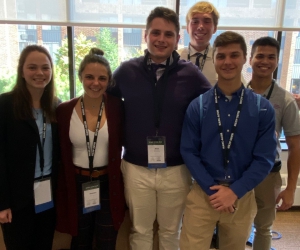
PhD Student Alberto Guzman-Alvarez Receives National Dissertation Fellowship
Alberto Guzman-Alvarez, a PhD student in Learning Sciences and Policy at the University of Pittsburgh School of Education, has received a coveted 2021 Dissertation Fellowship from the National Academy of Education and the Spencer Foundation (NAEd/Spencer).
Providing $27,500 in funding support, NAEd Spencer dissertation fellowships support emerging scholars who are undertaking new research that is relevant to the improvement of education. Thirty-five fellowships were awarded this year, following a competitive review of applications.
“I am incredibly humbled to receive the fellowship and am very lucky to have been chosen,” says Guzman-Alvarez. “I am excited to get the time and space to be part of the fellowship and to have that time to devote to my dissertation.”
In his work, Guzman-Alvarez seeks to use data as a tool for social justice. He explores education policies and interventions, particularly as they relate to college access for historically marginalized students. The topic has personal meaning for Guzman-Alvarez. He is a first-generation college student who was raised by Mexican immigrant parents in California.
His dissertation, titled “Deep learning for investigating causal effects with high-dimensional data: analytic tools and applications to educational interventions,” is meant to bridge the worlds of education research and the computer sciences.
A Strong Support System
“The NAEd/Spencer Dissertation Fellowship is one of the highest honors bestowed on educational doctoral students,” says Jennifer Lin Russell, professor and chair of the Department of Educational Foundations, Organizations and Policy at Pitt Education and Associate Director at Pitt’s Learning Research and Development Center. “Alberto is taking on issues with great societal importance in his research. In so doing, his research stands to contribute to a more just and equitable educational system.”
Guzman-Alvarez credits the Pitt Education faculty, as well as his friends and fellow doctoral students, for providing him with a rich support system for his scholarly work. He is especially thankful for his co-advisors, Associate Professor Lindsay Page and Assistant Professor Xu Qin.
With Page, he co-authored a research study that analyzed the administrative cost to colleges and universities from the FAFSA verification mandate. The work received media attention and was cited in a congressional committee hearing on college access.
“It has been terrific to work with Alberto since he arrived at Pitt as a master’s student in Research Methodology,” says Page. “Since that time, he has developed advanced quantitative research skills as well as the comparatively rare gift of being able to apply those skills meaningfully to important questions related to educational access and equity, particularly for minoritized populations.”
Qin complimented Guzman-Alvarez for focusing his dissertation on developing new quantitative methods that will help other scholars to conduct more sophisticated educational research.
“It is such a great honor to be awarded the highly competitive NAEd/Spencer Dissertation Fellowship. His work will bring fresh and constructive perspectives to method development in causal inference and advance educational equity,” says Qin.
Developing New Methods for Researchers
Because of the NAEd/Spencer Fellowship, Guzman-Alvarez will have additional time to work on his dissertation prior to graduating from Pitt Education.
In his dissertation, Guzman-Alvarez aims to develop new analytical procedures for very large data sets that will allow researchers to make more effective causal inferences and explore causal mediations. In short, this will allow researchers performing quasi-experimental studies to establish causal claims when using the kinds of large datasets that are becoming increasingly common in education research.
His new research method will incorporate advances in deep neural networks from artificial intelligence-based machine learning.
“It will answer how we create those cause-and-effect conclusions in educational interventions when there are very large amounts of data available on students and institutions, which is valuable information any social scientist can use,” says Guzman-Alvarez.
While the new research methods that Guzman-Alvarez is developing are complicated, he is guided by a simple truth in all aspects of his work.
“The people behind my work are actual students and are not just numbers. They are more than rows on an Excel sheet,” he says.
Learn More
The University of Pittsburgh School of Education offers PhD programs in a range of areas. Applications are now being accepted.




